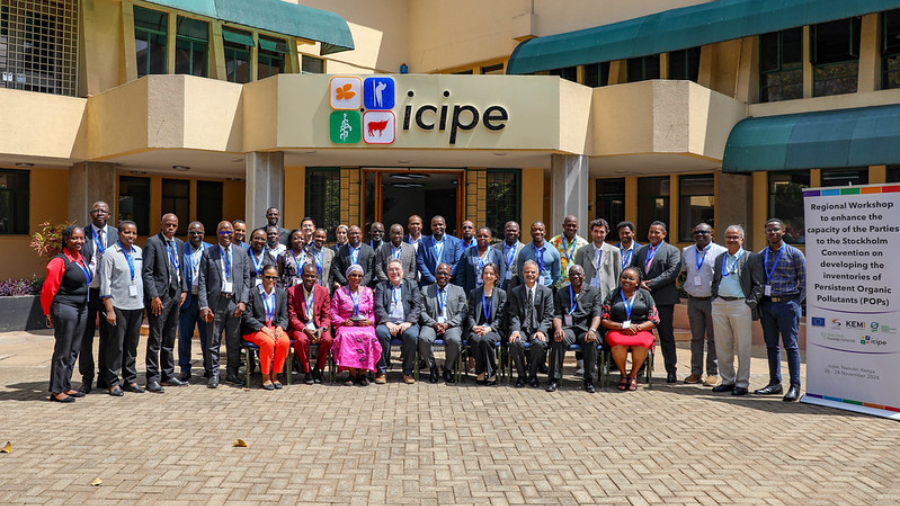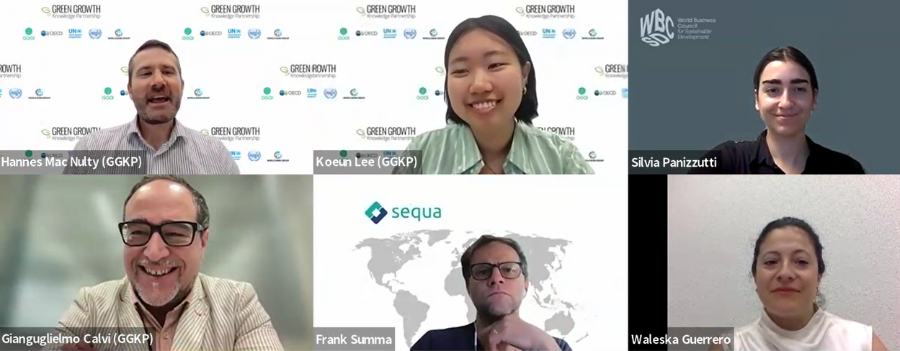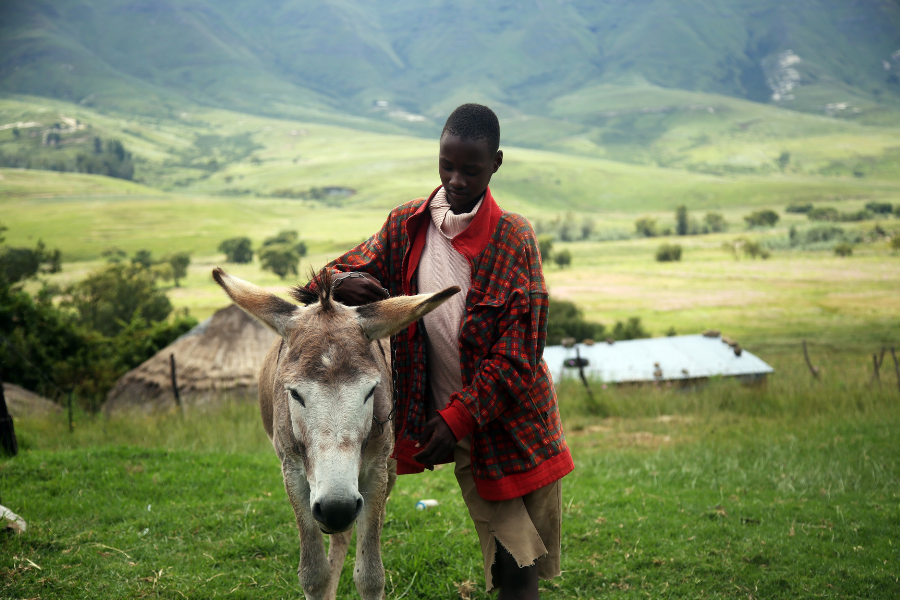
The Green Growth Knowledge Partnership (GGKP) achieved significant milestones in 2024, including launching two new programmes – one on agricultural chemicals and plastics and one on the circular economy – and expanding current initiatives to new regions, developing AI-enhanced knowledge management systems and strengthening ongoing partnerships.
GGKP, through its three knowledge platforms – Green Policy Platform, Green Industry Platform and Green Finance Platform – and the Green Forum community space, provides guidance, data and tools to transition to an inclusive green economy. In addition, it provides the digital infrastructure used by initiatives and programmes across the green economy space.
GGKP worked with its global partners throughout the year to advance key global goals, offering knowledge, infrastructure and tools for a nature-positive, pollution-free, and climate-friendly economy.
-
-
Partnerships for a Less Toxic World
Launch of the GEF FARM Programme
In March 2024, the Financing Agrochemical Reduction and Management (FARM) Programme officially launched at an event in Nairobi, Kenya. FARM seeks to reduce the use of harmful pesticides and plastics in agricultural production and encourage the adoption of low and non-chemical alternatives.
Led by the United Nations Environment Programme (UNEP) and implemented by the Asian Development Bank (ADB), United Nations Development Programme (UNDP) and United Nations Industrial Development Organization (UNIDO), the Global Environment Facility-funded FARM Programme operates in Ecuador, India, Kenya, Lao PDR, the Philippines, Uruguay and Viet Nam. GGKP executes the global child project on behalf of UNEP.
In conjunction with the launch, the GGKP organized a four-day FARM Global Child Project Inception Meeting, which brought together over 70 FARM partners and stakeholders. This provided an opportunity to introduce the programme and begin foundational discussions on current knowledge and skill gaps.
The GGKP also established the FARM Group on the Green Forum – a space for collaboration and learning – which is open to anyone interested in or currently working towards a toxic-free food system.
Learn more

-
A global network to address chemicals and waste
In 2024, the Green Forum continued to serve as a hub for critical discussions and knowledge sharing on chemicals and waste management, connecting experts, practitioners and advocates worldwide. Within this network, the Chemicals and Waste Management Community of Practice (CoP) emerged as one of the leading platforms dedicated to tackling pressing challenges around chemicals and waste. The CoP continues to grow with over 720 members and remains an accessible platform to discuss relevant trends, challenges and opportunities under the theme.
In October 2024, GGKP and the Global Framework on Chemicals (GFC) Secretariat co-hosted a virtual CoP discussion on the Global Framework on Chemicals Fund. This event provided a crucial session to explore how the fund aims to drive transformative change by financing projects and programmes that prevent or minimize the harm caused by chemicals and waste.
This CoP underscores the Green Forum’s commitment to fostering specialized communities that advance sustainable practices, empower stakeholders with actionable insights and create collaborative opportunities to advance sustainable economic transformation.
Learn more
-
Supporting compliance with the Stockholm Convention
As part of the GEF-funded National Implementation Plan (NIP) Update Project, GGKP organized a series of 12 training webinars throughout the year for Stockholm Convention stakeholders, including official contact points and national focal points and officials. It also included experts involved in the process of reviewing and updating the NIPs, practitioners working on POPs inventory and chemicals management, members of NIP National Coordinating Mechanisms, and Project Coordination Units from over 32 countries in Africa, Caribbean, Latin America, Asia and Europe.
Training webinars focused on new knowledge resources developed by the project to facilitate data collection, POPs inventory development, and overall NIP development. The webinars were delivered by international POPs experts and authors of the guidance documents, providing participants with step-by-step guidelines on the application of the new technical knowledge and existing resources given the settings and constraints in the countries.
In collaboration with the Basel, Rotterdam and Stockholm Conventions (BRS) Secretariat, GGKP also organized an in-person three-day technical workshop for the Parties to the Stockholm Convention on 26-28 November 2024 in Nairobi, Kenya. The workshop was attended by more than 32 participants from African countries working on their NIPs, including Burundi, Cameroon, Côte d’Ivoire, Senegal, Togo, Gambia, South Africa, Seychelles, Uganda, Guinea, Kenya, Ethiopia, Madagascar, Zimbabwe and Malawi. Participants learned how to develop sectoral inventories for Persistent Organic Pollutants (POPs), apply tools for harmonized reporting, and identify actions for sustainable waste and plastic management.
Learn more

-
Turning the tide in new regions
The Atlantic and the Indian Ocean regional projects of the GEF-funded Implementing Sustainable Low and Non-chemical Development in Small Island Developing States (ISLANDS) Programme launched in 2024. Composed of six child projects, ISLANDS aims to safely and sustainably manage hazardous chemicals and waste in 33 small islands developing states (SIDS). GGKP executes the ISLANDS global child project.
During both inception events, GGKP presented the global project and provided training. The Atlantic project inception workshop took place in Praia, Cabo Verde, in April 2024, and the Indian Ocean project held its regional inception workshop in June 2024 in Port-Louis, Mauritius. Together, these two regional projects are projected to reduce some 299 (metric) tonnes of chemicals of global concern, safely dispose of 291 tonnes of POPs, reduce 7.8 tonnes of mercury, avoid 12,200 tonnes of marine litter and safely manage 19,461 tonnes of contaminated materials, improving the lives of about 1.5 million people.
As the knowledge broker for ISLANDS, GGKP increased the number of curated knowledge available on the ISLANDS website and added a new thematic issue page on highly hazardous pesticides (HHPs), providing synthesized information and knowledge products on the topic.
Learn more
-
-
Circling towards Efficiency
Bridging together circular economy leaders and developing a shared language
In 2024, GGKP and its partners worked together to develop a common framework for circular economy principles and knowledge, and launched a collaborative hub connecting circular economy leaders across industries, government and academia. By fostering dialogue and co-creation, the initiative facilitates the development of a shared language around circular economy principles, bridges gaps and enhances synergies for a circular economy transition.
Central to this effort is the creation of a common green and circular economy knowledge taxonomy – a system for classifying knowledge based on criteria such as knowledge type, topics, sectoral focus and target audience. This initiative would thereby provide a shared framework that can be applied by any national, regional, or global knowledge platform wishing to effectively share knowledge between each other and with their target audiences. The use of this taxonomy will allow GGKP and other organizations to provide more targeted and relevant knowledge to support different end-users implement green and circular economy actions related to their specific needs.

-
Learn more
- Circular Economy Knowledge Taxonomy
- GGKP launches Circular Economy Leaders’ Community
- Circular Economy Leaders Community
-
Connecting with SMEs to reduce waste and increase efficiency
GGKP has continued supporting small and medium-sized enterprises (SMEs) in enhancing their resource efficiency through business-supporting organizations. In 2024, the Green Industry Platform organized a series of online roundtables, focusing on increasing the impact of resource efficiency for SMEs and facilitating peer engagement with resource efficiency experts. These roundtables addressed topics such as textiles, e-waste and green entrepreneurship.
GGKP has also partnered with the United Nations Office for Sustainable Development (UNOSD) to deliver the Waste Management and Circular Economy Policy Support System (WMPSS), a digital platform that provides countries with practical tools to strengthen their waste management practices. GGKP's expertise and technology ensure the platform effectively bridges knowledge gaps, supporting countries in advancing waste management and resource circularity.
Learn more
-
-
Data for a Nature-positive Economy
As part of its efforts on natural capital and achieving the UN Sustainable Development Goals (SDGs), GGKP, in collaboration with UNEP-WCMC, published a report in 2024 assessing the gap between current natural capital levels and what is needed to meet nature-related SDGs across 40 countries. A significant gap was identified, with an estimated investment of $7.4 trillion needed to close it. However, the incentive to close the gap is substantial, with benefits likely to exceed $152 trillion – an extraordinary return of $20 for every $1 invested.
part of its efforts on natural capital and achieving the UN Sustainable Development Goals (SDGs), GGKP, in collaboration with UNEP-WCMC, published a report in 2024 assessing the gap between current natural capital levels and what is needed to meet nature-related SDGs across 40 countries. A significant gap was identified, with an estimated investment of $7.4 trillion needed to close it. However, the incentive to close the gap is substantial, with benefits likely to exceed $152 trillion – an extraordinary return of $20 for every $1 invested.
Additionally, GGKP and its Natural Capital for African Development Finance (NC4-DF) Initiative partners held a webinar in November 2024, in collaboration with the African Natural Capital Accounting Community of Practice, to explore the role of natural capital in Africa’s financial sector and share tools and approaches for integrating natural capital into decision-making. Key knowledge products developed during the NC4-ADF Initiative were also highlighted:
- Activating the Green Recovery Action Plans in Africa Through Nature-Based Solutions and Natural Capital Approaches
- Financing Green Recovery Using Natural Capital Approaches Across Africa
- Technical Note: Practical Applications of Natural Capital Approaches to Evaluating Investment Projects in Africa
- Natural Capital Assessment for Development Corridor Projects
Learn more
- Closing the Gap: Investing in natural capital to meet the SDGs
- Capturing the Value of Nature in African Development Finance for Green Growth and Climate Resilience
-
-
Transforming Knowledge Management
GGKP is transforming how it manages and shares knowledge across its network of partners and target audiences. The goal is to help the GGKP network - from policymakers to businesses - to more effectively access and apply GGKP's knowledge resources to address their specific needs.
In 2024, GGKP strengthened knowledge management by supporting its partners with strategic services, launching an innovative AI-powered Knowledge Management System (AI-KMS) and developing essential AI components. GGKP also identified additional advancements needed to increase the application of knowledge, such as improving how knowledge is exchanged between knowledge hubs and how it is consolidated and made more accessible to specific target audiences.
To address these needs, GGKP designed a new knowledge management system with two key features – a digital network which enables automated knowledge sharing between knowledge hubs and an AI solution to process all this consolidated knowledge to ensure each type of target audience can have tailored access to it. This AI-powered knowledge management system, scheduled to be deployed in 2025, will use the new common green and circular economy knowledge taxonomy as the basis for its new smart search capabilities and expert chatbots, which can quickly connect users with relevant information and expertise.
In early 2025, GGKP will launch the first stage of this targeted approach to curating knowledge and aligning resources with the specific needs of diverse audiences in the form of the new LEARN section for the GEF ISLANDS Programme, a milestone for GGKP platforms. By tailoring content to serve varied user requirements, GGKP ensures that the most accurate and relevant knowledge reaches its intended audience, marking a significant step forward in its mission to enhance accessibility and impact.
